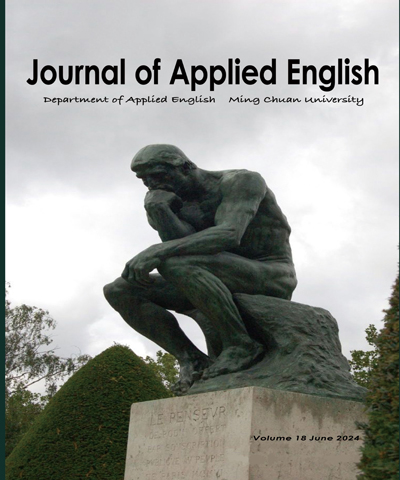
應用英語期刊/Journal of Applied English
銘傳大學應用英語學系所,正常發行
選擇卷期
- 期刊
While English intonation is highly subject to pragmatic settings, most Taiwanese English learners fail to get such knowledge, so they show diversified performances in their recognition, perception, and production. The main target for this study is the greeting sentence: How are you? In most English textbooks, it is classified into the pattern of rising-falling intonation. Accordingly, the researchers expect that English learners in Taiwan would follow this pattern. Recruited in this study were 52 subjects, all of them asked to take the cognition and perception tests, while only 27 of them participated in recording the greeting. The finding indicated that subjects had no clear idea of what intonation pattern should come with the greeting. Most subjects recognized and perceived that rising or rising-falling intonation was the best for the greeting, but they preferred to use rising-falling and falling-rising in production. Save for native language interference for the falling-rising intonation, what was revealed was that EFL (English as a foreign language) learners found it difficult to learn (acquire) English prosody eventually.
- 期刊
The reading of literature is integral to the study of a language. Electronic books, as read on mobile devices, have become increasingly popular. The purpose of this study was to explore how these devices can be used effectively by EFL students, with a focus on reading comprehension. 100 university and high school level students read three stories over 2.5 months. One group of students read from mobile devices, while another group read from conventional books. One pretest and two post-tests were given to see their performance and retention of the stories. Students using mobile devices were also given a questionnaire and an interview to note their opinions regarding mobile devices as well as conventional methods of reading. The results showed that students with mobile devices are able to achieve a higher score. The questionnaire results, however, found that most students are quite conservative in their attitudes towards reading, indicating that they prefer to read from conventional books and expect future reading will continue to be done in this way. The study concludes that while the technology for reading e-books is demonstrably effective, students' attitudes towards their use will need to change before wide adoption can take place.
- 期刊
Reading strategies have been evidenced to assist reading comprehension, and learner's preferences for strategies have been of interest to researchers. However, statistical inconsistencies in the existing studies remained unsolved, which leads to various explanations. Studies featuring students at tertiary level have been limited in Taiwan. Furthermore, little is known of the relationship between study abroad experiences and reading strategies. To fill the above gaps, the study attempted to understand if variables (including gender, grade level, starting age of English learning, self-perceived English proficiency level, and overseas study experiences) affect learners' use of metacognitive reading strategies. To measure students' strategy use, the Metacognitive Awareness Reading Strategy Inventory (MARSI) was translated into Chinese and administered to 414 university English-majors in Taiwan. Results indicated that only self-perceived English proficiency significantly predicted learners' strategy use. The overseas study experiences demonstrated a negative correlation with learners' use of strategies. The findings have implications for language pedagogy and future research.
- 期刊
In Taiwan, English-as-a-foreign-language (EFL) learners, in general, have few opportunities to use English outside the classroom, which, in turn, undermines their achievement in English proficiency. Thus, a citywide project was developed in which elementary school students videoconferenced with native English-speaking teachers. The project aimed to increase English learning opportunities, to provide convenient access to English-speaking environments without the constraint of location, and to promote student digital literacy with the hands-on experience of using communication programs. Although numerous aspects of videoconferencing for language learning have been discussed, previous literature was primarily concerned with European and American contexts. This exploratory study investigated the perception that elementary-school students in Taiwan had of videoconferencing in learning English and its effect on their learning of English. One hundred eighty-two valid surveys were collected from participants from grades three to six, and who completed a post-videoconference perception survey. It was found, through the quantitative and qualitative analysis of their responses, that they recognized the value of videoconferencing in their learning of English and had positive attitudes toward videoconferencing. They remained highly confident in using English and became more willing to speak English. They were also more motivated to learn English after the activity and were keen to participate in the activity again. However, they felt more anxious during the videoconference than in a classroom setting. Possible explanations for such findings might be the novelty effect, teachers' interventions, and a ceiling effect. Practical implications and suggestions for future studies are provided.

